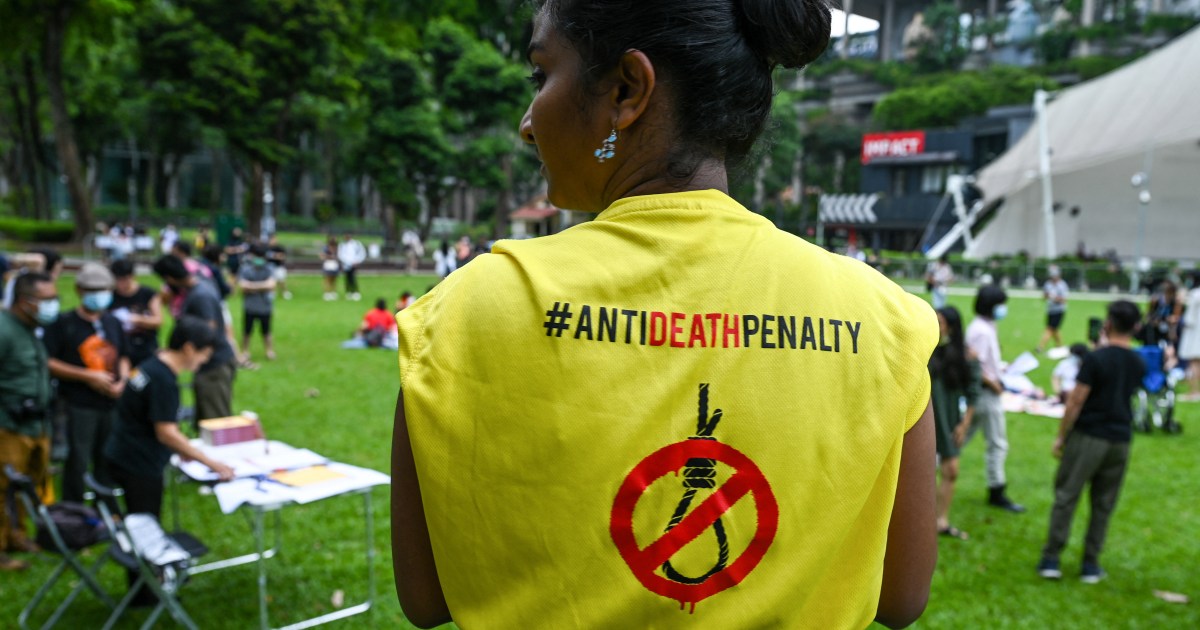Singapore carries out fifth execution since March
Nazeri bin Lajim was hanged early on Friday morning for drug offences, the latest in a ‘relentless wave’ of executions.
Nazeri bin Lajim, who was convicted of drug trafficking five years ago, has been hanged in Singapore’s Changi Prison.
The 64-year-old Singaporean was executed on Friday morning as scheduled, the city-state’s prison service confirmed in an emailed statement to the AFP news agency.
Singapore has carried out a series of hangings in recent months, fuelling rare debate over the country’s continued use of the death penalty, particularly in drugs cases.
“Five people have been hanged this year in Singapore in period of less than four months,” Amnesty International’s death penalty expert Chiara Sangiorgio said in a statement, noting that all those executed were drug offenders. “This relentless wave of hangings must stop immediately.”
Abdul Kahar Othman, a Singaporean, was the first to be hanged, with his execution on March 30 ending a two-year pause in the use of the death penalty.
In April, the country went ahead with the execution of Nagaenthran Dharmalingam, a Malaysian with learning disabilities, whose case drew global attention and numerous appeals for clemency from his family, United Nations experts, the European Union and the Malaysian government.
The court hearing his final appeals said the efforts to save Nagaenthran’s life were a “blatant and egregious abuse” of the legal process, and that it was “improper to engage in or encourage last-ditch attempts” to delay or stop an execution.
Nazeri too hoped for a last minute reprieve, arguing from prison via Zoom on Thursday for a stay of execution to allow him to find a lawyer. M Ravi, who represented him previously, has had his certificate to practice law taken away. The court rejected his appeal.
Nazeri was arrested in 2012 after being found with 33.39 grams (1.18 ounces) of heroin. Singapore considers anyone with more than 15 grams (0.5 of an ounce) of the drug to be a trafficker and imposes a mandatory death sentence.
These are photos from Nazeri’s photoshoot before his execution. When his family members visited him, he insisted that they should be happy, rather than spend their precious time together sad and depressed. @gunsnroses’ Sweet Child O’ Mine was his favourite song. #deathpenalty pic.twitter.com/Jc3X4KLXr5
— Kirsten Han 韩俐颖 (@kixes) July 22, 2022
Singapore argues that the death penalty is necessary to deter crime and drug trafficking.
In a statement released after Nagaenthran’s execution, a group of UN human rights experts said Singapore’s continued use of capital punishment for drug-related crimes was contrary to international law. It stressed that countries that maintained the death penalty should use it for only “the most serious crimes” and that drug offences did not meet the threshold.
The United Nations Office on Drugs and Crime (UNODC) and the International Narcotics Control Board (INCB) have also condemned the use of capital punishment for drug crimes.
In its most recent report on the use of the death penalty around the world, Amnesty International said that while executions surged in 2021, the global trend remains towards abolition.
Currently, some 110 countries have abolished the death penalty for all crimes and more than two-thirds of nations are abolitionist in law or practice, it said.




